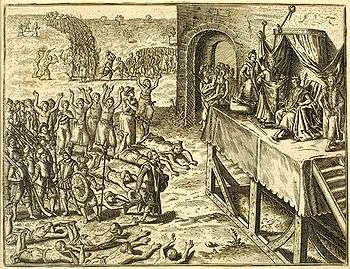Manikongo
The Manikongo or Mwene Kongo was the title of the ruler of the Kingdom of Kongo, a kingdom that existed from the fourteenth to the nineteenth centuries and consisted of land in present-day Angola, Republic of the Congo and the Democratic Republic of Congo. The manikongo's seat of power was Mbanza Kongo (also called São Salvador in 1570–1975), now the capital of Zaire Province in Angola. The manikongo appointed governors for the provinces of the Kingdom and received tribute from neighbouring subjects.

The term "manikongo" is derived from Portuguese "manicongo", an alteration of the KiKongo term Mwene Kongo (literally "lord of Kongo"). The term "wene", from which "mwene" is derived, is also used to mean kingdom, and is attested with this meaning in the Kongo catechism of 1624 with reference to the Kingdom of Heaven. The term "mwene" is created by adding the personal prefix mu- to this stem, to mean "person of the kingdom".
Mani is attested in very early texts, notably the letters of King Afonso I of Kongo, where he writes, to kings Manuel I (in 1514) and João III concerning the "manipango" (mwene Mpangu). Mani was used to mean not only "king", but also anyone holding authority, so provincial and sub-provincial officials also were called "mani".
See also
- List of Manikongo of Kongo